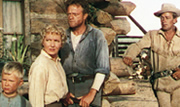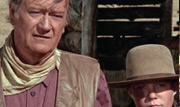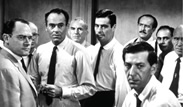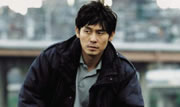
What's your favorite film? Is there a movie that changed your life? Send us an essay of 500 words, give or take, about that film you can't forget – classic or contemporary – and we'll consider it for publication in these pages. In addition to your short essay, send your name, occupation, hometown, phone number, jpeg headshot and e-mail address to Editor@AFI.com. We reserve the right to edit for length and clarity.
READER REVIEW: OAKLAND, OPRAH AND ME
By Ben Bernstein

Ben Bernstein is a veteran psychologist and teacher in Oakland, California. He is the author of "Test Success! How to Be Calm, Confident and Focused on Any Test." Click here for more information.
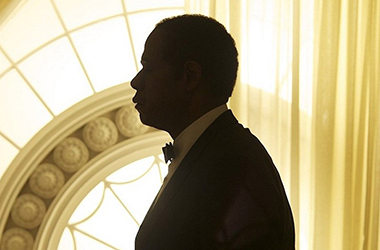 On the same night not long ago I saw Ryan Coogler's FRUITVALE STATION and LEE DANIELS' THE BUTLER at our local cineplex in Oakland. Both movies left me unsettled, not because of what they portrayed, but because of what they didn't.
On the same night not long ago I saw Ryan Coogler's FRUITVALE STATION and LEE DANIELS' THE BUTLER at our local cineplex in Oakland. Both movies left me unsettled, not because of what they portrayed, but because of what they didn't.
With great economy and heartbreaking simplicity, Coogler shows Oscar Grant, a young black ex-con, struggling to keep it together on New Year's Eve. The film ends with Oscar being brutally shot to death on a subway platform by an angry, scared white police officer. Michael B. Jordan and Octavia Spencer head a cast that offers a devastating mixture of hope and sorrow.
THE BUTLER begins where FRUITVALE STATION leaves off. A black boy, Cecil, watches his father get fatally shot by a crazy, angry white man in the middle of a Southern plantation field. For the rest of the movie we watch Cecil's rise from being a "house n––––r" (quoting Vanessa Redgrave's character), to a White House butler while Cecil's son turns into a civil rights activist.
The best thing about THE BUTLER is Oprah Winfrey. When she first came on the screen I immediately felt warm and connected. I had forgotten what an excellent actress she is. Her eyes, small yet so expressive, drew me into the complex mixture of her character's emotions and thoughts. I wanted to keep watching her but kept getting distracted by the movie, a cooked-up, yet sometimes affecting, smorgasbord of historical vignettes. Robin Williams as Dwight D. Eisenhower? Jane Fonda as Nancy Reagan?
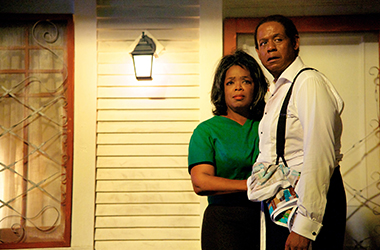 Oprah plays Gloria Gaines, wife to Forest Whitaker's Cecil. She drinks, she sweats, he swears, she sews, she dresses up, she even gets invited to the White House by Nancy-Jane. Oprah! Listed by Forbes Magazine as #1 on its Celebrity List and #64 of the World's Most Powerful People! The casting – and the irony – are stupendous. Who better to play the part of a struggling black woman in the '50s and '60s than Oprah? She has lived the story.
Oprah plays Gloria Gaines, wife to Forest Whitaker's Cecil. She drinks, she sweats, he swears, she sews, she dresses up, she even gets invited to the White House by Nancy-Jane. Oprah! Listed by Forbes Magazine as #1 on its Celebrity List and #64 of the World's Most Powerful People! The casting – and the irony – are stupendous. Who better to play the part of a struggling black woman in the '50s and '60s than Oprah? She has lived the story.
While Daniels shows us the horrors of violence that blacks were subjected to, and Coogler updates that more intimately, what we end up with in both films is story-as-history from the black perspective. What we don't get is the white side of the equation. As a white psychologist, I sat through both films with questions that grew more intense as the films progressed: Why are white people so angry? What are we still so scared of? By what right have we perpetuated oppression, hate, fear and the forces that keep black people – indeed, all non-whites – economically, politically and socially repressed since this country was founded?
Showing history over and over again, either on a grand (BUTLER) or small (FRUITVALE) scale, doesn't address why we are in the mess we are in. And we are in a mess. My wife and I live in Oakland. It's a racially tense town. On our block there are daytime burglaries and nighttime murders. It's not much better nationally: stand-your-ground laws, senators campaigning to get our president out of the White House; our representatives battling against each other on immigration reform.
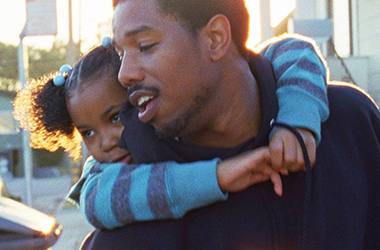 Watching both films with a local and diverse audience – black, white, Asian, Hispanic – was revealing: during THE BUTLER moviegoers often cackled at the film's silliness, in FRUITVALE STATION they gasped. When I left the theater I was unsettled. When will a filmmaker, of any race, get under the events and show the root causes of hate, fear, repression and racism?
Watching both films with a local and diverse audience – black, white, Asian, Hispanic – was revealing: during THE BUTLER moviegoers often cackled at the film's silliness, in FRUITVALE STATION they gasped. When I left the theater I was unsettled. When will a filmmaker, of any race, get under the events and show the root causes of hate, fear, repression and racism?
I saw both films on the eve of the 50th anniversary of the March on Washington and Dr. King's “I have a dream” speech. Yes, we are living more in his dream, but there's still too much nightmare. While these two films vividly portray our sad, terribly uncomfortable history, I want to go deeper. I want a filmmaker to ask what is it in our founders, ourselves and – ultimately – in myself, that creates and perpetuates separation, fear and antagonism between human beings? Unless – and until – we dig into this question, the nightmare will continue.
READER REVIEW: MAGIC
By Jay K. Johnson

Actor and ventriloquist Jay K. Johnson won the Tony Award® in 2007 for performing and writing "Jay Johnson: The Two and Only," his one-man Broadway show. He lives in Encino, California.
 The year after I arrived in Los Angeles to seek my fame and fortune as an actor/ventriloquist, William Goldman published a book called "Magic" – marketed as "a novel by the author of MARATHON MAN." It's the story of a young magician/ventriloquist whose quest for fame and fortune leads him to commit a series of murders. It is a great psychological suspense thriller. I love stories like this. I have always wanted to play a great part like that in a movie. I was one of the countless actors who arrived in Hollywood that year for the same reason.
The year after I arrived in Los Angeles to seek my fame and fortune as an actor/ventriloquist, William Goldman published a book called "Magic" – marketed as "a novel by the author of MARATHON MAN." It's the story of a young magician/ventriloquist whose quest for fame and fortune leads him to commit a series of murders. It is a great psychological suspense thriller. I love stories like this. I have always wanted to play a great part like that in a movie. I was one of the countless actors who arrived in Hollywood that year for the same reason.
William Goldman's novel, "The Marathon Man," was made into a hit film a few years before I arrived in town. A friend loaned me Goldman's new book, "Magic." He joked that even a dyslexic like me might read a book if there were a character in it I could play in the movie. He was right.
After reading "Magic" I marched into my personal manager's office, book in hand, and said, "They will make a movie of this book, and I am the only one in the world who can play this part. I am the right age, my hobby is magic and I am a ventriloquist. I know exactly how to play this character." I thought Goldman found the first real psychological trigger that might make a ventriloquist snap. It was a brash display of over confidence from a newcomer, but how many times does a great ventriloquist role like this come up in a career? I was born to do that role.
That brashness and my personal manager's connections got me a meeting with the director. He came to see me perform on stage and wanted to figure a way to use me in the film. For the next two weeks I'm walking on air, sure that my time had arrived. I dissected the role of Corky and prepared for it with all my abilities. However, as is commonplace in the business of film, with no warning my director is suddenly out, Richard Attenborough takes over and that movie train leaves me at the station.
Joseph E. Levine, who paid a million dollars for the rights in 1970s money, produced the film. MAGIC is well written, directed, acted and shot. It will be remembered as a scary somewhat creepy genre film that predates the CHILD'S PLAY/CHUCKY series.
Attenborough cast Anthony Hopkins as Corky Withers, not me. To save face, I told myself he cast older and more British than me. To complete the cast, Burgess Meredith plays Corky's Rolls Royce-driving agent and ultimate victim, "The Postman" (because he always delivers) Ben Greene. Ann-Margaret is perfect as the "to die for" girlfriend and Corky's unrequited love, Peggy Ann Snow. Ed Lauter as the suspicious and threatening husband Duke, is exactly as I saw him in my mind.
During a scene at the Lake Melody cabin, Corky tries to convince Ben Greene that he is not insane. The agent proposes a simple test: Corky must sit quietly for five minutes without letting his puppet talk. That task, which Greene claims "anybody should be able to do, kid," becomes Corky's unraveling. We watch him snap. He can't do it. Anthony Hopkins' performance is amazing. This is 13 years before his chilling Oscar®-winning performance as Hannibal Lecter, but his acting chops were already well honed.
 MAGIC is a scary movie. Fats, the villain, is a bigger than life ventriloquist's puppet who is an imposing and controlling psychopathic manifestation of Corky's inner demon. Fats is particularly scary for those who are afraid of clowns and knife wielding puppets.
MAGIC is a scary movie. Fats, the villain, is a bigger than life ventriloquist's puppet who is an imposing and controlling psychopathic manifestation of Corky's inner demon. Fats is particularly scary for those who are afraid of clowns and knife wielding puppets.
Unfortunately, after all that, the film doesn't measure up to the story in the book. In fact, the film is just the last chapter of the book. It is only then that we discover Fats is a ventriloquist's puppet. Until that moment, the reader doesn't know who this guy Fats is; nor do we understand why Corky hangs around with such a mean and manipulating friend.
Sure, everything comes to a climax and is resolved in the final chapter, but you don't get the incredible backstory that makes this tale so compelling. The script completely omits the psychological trauma responsible for Corky's actions. Instead of being a wonderful study of a split personality as in the book, the movie leaves us with the idea that Corky becomes a crazed murder because he is a ventriloquist.
That theme is old and hackneyed. It has been around since a 1945 black and white film called DEAD OF NIGHT. In that horror film, a young Michael Redgrave delivers the iconic portrayal of a crazy ventriloquist. This crazy character has never been performed better nor differently since Redgrave did it in 1945. But the story in MAGIC is unique and different. It suggests a real, complicated reason why a ventriloquist might get pushed over the edge of sanity.
It is not just the streamlining of the story that is a problem for me. I think Anthony Hopkins chose to play Corky totally wrong – for all the right artistic reasons.
Corky is a multiple personality. He is the nice, shy ventriloquist Corky, but also the evil puppet Fats. When an actor chooses which personality to be in a role like this, the evil side is always a more interesting part to play. Hopkins decided to play Fats throughout the movie and rightly so.
However, this left no room for the character of Corky to exist in the movie. There are not two distinct personalities, only one – the crazy Fats. Corky is Fats from the first moment we see him in the film. We simply watch that fact play out. It would have been a better film if we slowly discover that Corky and Fats are actually one disturbed person, not two. That revelation in the book was a major skin crawl for me.
However, that is just my ventriloquial opinion; I don't know if the movie would have been more successful had they been able to do the story I remember from the novel.
It is not easy to find the movie MAGIC to rent or stream. I found it on YouTube, but because the scary stuff takes place at night you'll be watching a black screen a lot in a small format. I wish I could see MAGIC again the way it was intended – in a movie theater. Then you could see some great acting and scary scenes, but unfortunately the size of the medium would not fix the story.
 Outside the fact that MAGIC is about a ventriloquist, why would I choose to discuss this 1978 film that is so hard to find today? Well, in 1977, I asked Susan Harris where she came up with the ventriloquist character of Chuck and Bob for her television show SOAP. She said she read the book "Magic" by William Goldman and loved it, especially the main character. She copied the physical description of Corky Withers, the crazy ventriloquist, and wrote him into the story bible of SOAP as a murderer. A year before the movie was released, I was cast to play that part. They liked my work, so instead of making me the killer and writing me out, I stayed for the run of the series playing Chuck and Bob.
Outside the fact that MAGIC is about a ventriloquist, why would I choose to discuss this 1978 film that is so hard to find today? Well, in 1977, I asked Susan Harris where she came up with the ventriloquist character of Chuck and Bob for her television show SOAP. She said she read the book "Magic" by William Goldman and loved it, especially the main character. She copied the physical description of Corky Withers, the crazy ventriloquist, and wrote him into the story bible of SOAP as a murderer. A year before the movie was released, I was cast to play that part. They liked my work, so instead of making me the killer and writing me out, I stayed for the run of the series playing Chuck and Bob.
There is a moment near the end of the film MAGIC when Corky and Fats are dressed in the same sweater outfit. The first time I saw that scene in a theater someone two rows behind whispered in the dark loud enough for most to hear, "Oh my God…it looks like Chuck and Bob from SOAP."
I knew I was born to do that role.
Edit Here
|
Edit Here |

